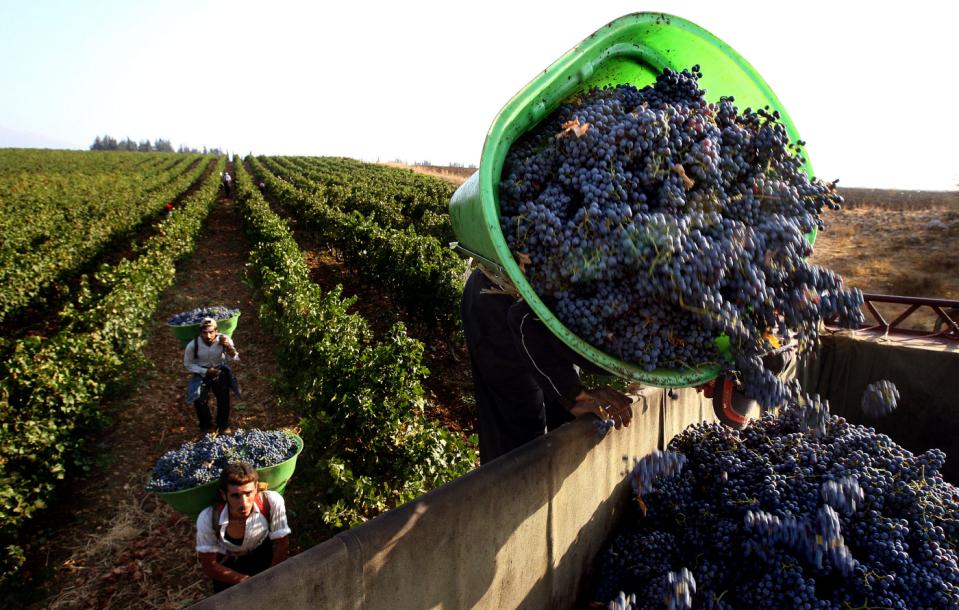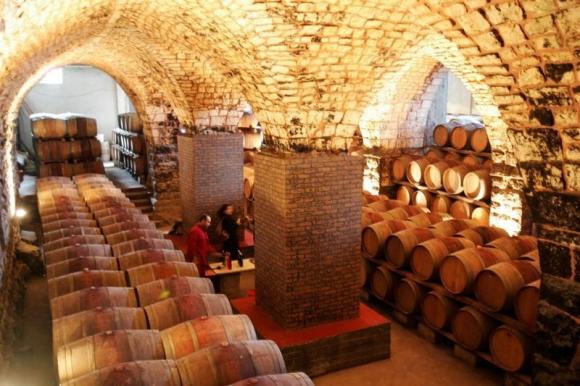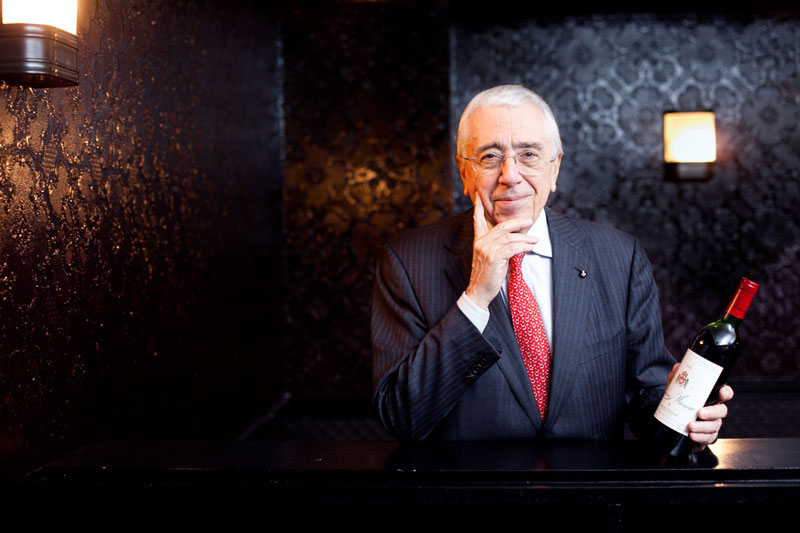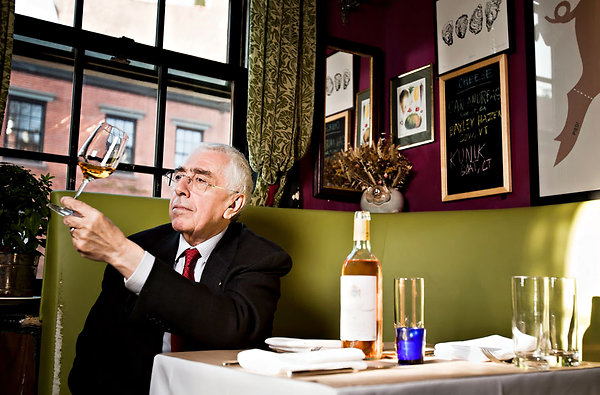



Serge Hochar, who navigated Chateau Musar, his family’s winery in Lebanon, through 15 years of civil war as Musar became one of the most admired wine producers in the world, died on Wednesday in Acapulco, Mexico. He was 75. He had been vacationing with his family and died while swimming in the ocean, said Catherine Miles, a vice president of Broadbent Selections, Musar’s American importer. No cause was announced.
Mr. Hochar (pronounced HO-shar) oversaw production for Musar, but he was more than a winemaker. He was also an entrepreneur who crisscrossed six continents promoting his idiosyncratic, long-lived wines as well as the ancient wine culture of Lebanon, which had been moribund when his father, Gaston, founded Musar in 1930.
Musar’s success helped build the modern Lebanese wine industry. When the civil war ended in 1990, just five wineries were operating in Lebanon. By 2014 there were almost 50, Mr. Hochar said in an interview last spring.
Beyond producing and selling wine, Mr. Hochar, elegant and charismatic, was also something of a sage. His aphoristic, mischievous, almost paradoxical insights on wine, food and life, delivered in any of five languages, turned conventional wisdom on its head and won him a devoted following in the wine trade.
“I know nothing about wine,” he told an audience at a wine dinner in New York in 2012, the sort of event where pronouncements are dispensed with an air of easy confidence and certainty. “I know how to make wine, but I know nothing about wine, and each day I discover that I know less.”
At that same dinner, held to spotlight older vintages of Musar, he reversed the customary order of service, providing the red wines with a meat course before the white wines with poultry.
“Once you taste the wines, you’ll understand why my white is my biggest red,” he explained.
The Musar wines, both red and white, were extraordinary, though decidedly not to everybody’s taste. The red resembled Bordeaux in spirit, though it departed from the model in significant ways. It was made not only of cabernet sauvignon, the major grape of red Bordeaux, but also of cinsault and carignan, grapes from the South of France.
As a result, the wine could age and evolve for decades, like a good Bordeaux, but it was spicy and rich with a distinctive funkiness that many critics labeled a flaw but devotees embraced as soulful.
The whites were, if possible, even more singular. Made from the ancient, indigenous Lebanese grapes obaideh and merwah, they were bigger and richer than the reds, with a complex, slightly honeyed flavor that seemed simultaneously sweet and dry. Opaque and impenetrable in their youth, they blossomed at 20 years or more of age.
The Musar wines inspired a younger generation of natural winemakers, in part because of Mr. Hochar’s hands-off method of production; they have proudly embraced characteristics like volatile acidity, or V.A. — deemed faults by critics who preferred squeaky clean wines.
“Wine is such a complex thing, and V.A. is part of wine,” Mr. Hochar said. “If you have none, it’s a flaw. It’s part of fermentation. It’s a question of balance. Life is harmony.”
Serge Gaston Hochar was born on Nov. 20, 1939, in Beirut, Lebanon, to a family of ancient French lineage that had arrived in Lebanon during the Crusades. His father, Gaston Hochar, studied grape-growing and winemaking in Bordeaux and in 1930 planted his first grapes in the Bekaa Valley, an eastern region near the Syrian border.
Lebanon at the time was a largely Christian country under French control, and the French army was a major early customer for Musar’s wine. One young French officer, Ronald Barton, of the acclaimed Bordeaux estates Langoa-Barton and Léoville-Barton, was stationed in Lebanon and proved highly influential to Musar.
As a young man, Serge Hochar studied engineering and then winemaking with the renowned enologist Émile Peynaud at the University of Bordeaux. Years later, he said, he told Mr. Peynaud, “I make wine totally the opposite of the way you taught me.”
In 1959, he persuaded his father to step aside so that he could take over the winemaking duties at Musar. Soon after, his brother, Ronald (who was named after Mr. Barton), took charge of the commercial aspects of the winery. Back then, Musar sold most of its wines in Lebanon, but this began to change when civil war broke out in 1975, effectively destroying the domestic market for wine. By the time the war ended, the market for Musar’s wines was almost entirely international, built largely through Mr. Hochar’s efforts.
Despite shells falling in vineyards and Israeli tanks appearing at the winery, where the wine cellar doubled as a bomb shelter, Musar missed only one vintage during the war, in 1976, when electricity was out and roads were impassable, Mr. Hochar said. As the Musar wines began to show up outside Lebanon, the rest of the world took notice. In 1979, Michael Broadbent, a leading British wine critic and auctioneer, tasted Musar at a wine fair in England and pronounced the ’67 Musar a great find. In 1984, Decanter magazine, an influential British wine publication, named Mr. Hochar its first “Man of the Year,” citing his dedication to producing fine wines despite the war.
“Wine is above politics,” Mr. Hochar said in 2012. “Wine is tolerance.”
In recent years, Mr. Hochar ceded the day-to-day details of running the winery to his sons, Gaston and Marc, and to his nephew, Ronald Hochar’s son Ralph. They and his brother survive him, as do Mr. Hochar’s wife, Tania; a daughter, Karin; three sisters and seven grandchildren.
Even as he stepped back, Mr. Hochar maintained a relentless travel schedule. May 2012, a typical month, began with a pilgrimage to Lourdes, France. After returning to Beirut, he then departed to London for a wine fair before setting off for Hong Kong, South Korea and China. After returning again to Lebanon on May 16, he then visited Turkey, Paris, Lebanon again, then Brazil, all in an effort to explain Lebanese wine and Musar.
“To understand Lebanon is not easy,” he said. “The dimension of taste in Lebanon is different than anywhere else. Not better, but different. Better has no meaning.”
Beirut (AFP) - Serge Hochar, CEO of the famed Lebanese winery Chateau Musar and credited with cultivating an international reputation for his country's wine, has died aged 75.
His death on December 31 was announced by Chateau Musar on Facebook, and was marked in international wine publications including Wine Spectator.
"The father of Lebanese wine and the man behind Chateau Musar's recognition worldwide is watching us from the stars," a message posted on the winery's Facebook page said.
Wine Spectator hailed him as a "tireless pioneer in winemaking in Lebanon".
Hochar "was the man who launched Lebanese wines in the world," the president of Lebanon's Union Vinicole, Zafer Chaoui, told the local L'Orient Le Jour newspaper.
The daily reported that Hochar died in a swimming accident on holiday in Mexico.
Wine production goes back centuries in Lebanon, but it was not until the 1970s that the country began to gain an international reputation as a wine producer, thanks largely to Hochar.
He inherited the business founded by his father Gaston in 1930.
After studying winemaking in Bordeaux, he and his brother brought wine from the Bekaa valley in eastern Lebanon to the international market via the 1979 Bristol Wine Fair.
International expansion came amid Lebanon's brutal 1975-1990 civil war: with the local market destroyed by fighting, Chateau Musar began to focus on exports.
By the end of the conflict, the wine was found almost exclusively overseas, particularly in Britain.
Hochar was seen as key to both developing an international interest in Lebanon's wines and revitalising its wine industry after the civil war.
In an interview with The New York Times in 2014, he said that just five wineries were operating when the war ended in 1990.
By 2014, that number had grown to nearly 50.
"He was a philosopher king of winemaking who made wine fascinating, bewitching and fun," wrote Fiona Beckett, the British Guardian newspaper's wine critic.
The business's day-to-day operations had already been ceded to his sons and his nephew's son, but Hochar remained a key proponent of the winery and Lebanese wine in general.
"Wine is above politics," The New York Times quoted him as saying. "Wine is tolerance."